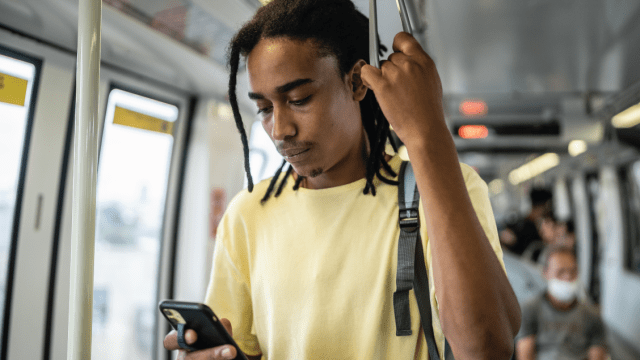
Black Americans have long had a complex relationship with the news media. In 1967, the Kerner Commission – a panel established by President Lyndon Johnson to investigate the causes of more than 150 urban riots in the United States – sharply criticized the media’s treatment of Black Americans.
More than 50 years later, there is ongoing discussion of many of the themes raised in the commission’s report. Amid these discussions, here are some key facts about Black Americans’ experiences with and attitudes toward the news, based on recent Pew Research Center surveys:
How we did this
This analysis is based on several recent Pew Research Center surveys, including our 2023 study on Black Americans’ experiences with news. Details on the methodologies of these surveys, including field dates and sample sizes, can be found by following the links in this analysis.
Pew Research Center is a subsidiary of The Pew Charitable Trusts, its primary funder. This is the latest report in Pew Research Center’s ongoing investigation of the state of news, information and journalism in the digital age, a research program funded by The Pew Charitable Trusts, with generous support from the John S. and James L. Knight Foundation.
Black Americans are more likely than other racial and ethnic groups in the U.S. to get their news on TV. About three-quarters of Black adults (76%) say they at least sometimes get news on TV, compared with 62% of both White and Hispanic adults and 52% of Asian adults. And 38% of Black Americans say they prefer to get their news on TV over any other platform – again higher than people of other racial or ethnic backgrounds.
Black Americans are more likely than White Americans to get news from certain social media sites. The shares of Black adults who say they regularly get news on YouTube (41%), Facebook (36%), Instagram (27%) and TikTok (22%) are each higher than the shares of White Americans who get news on these platforms. Like Americans overall, Black Americans get news from a wide variety of sources in addition to social media, including other digital platforms such as news websites and search engines.
Black Americans see issues with the way Black people are covered in the news, according to a 2023 survey. For example, 63% of Black adults say the news they see or hear about Black people is often more negative than the news about other racial and ethnic groups. And eight-in-ten say they at least sometimes see or hear news coverage about Black people that is racist or racially insensitive, including 39% who see such coverage extremely or fairly often.
We also asked Black Americans how likely it is that Black people will be covered fairly in the news in their lifetime. A relatively small share – 14% – see this as extremely or very likely.
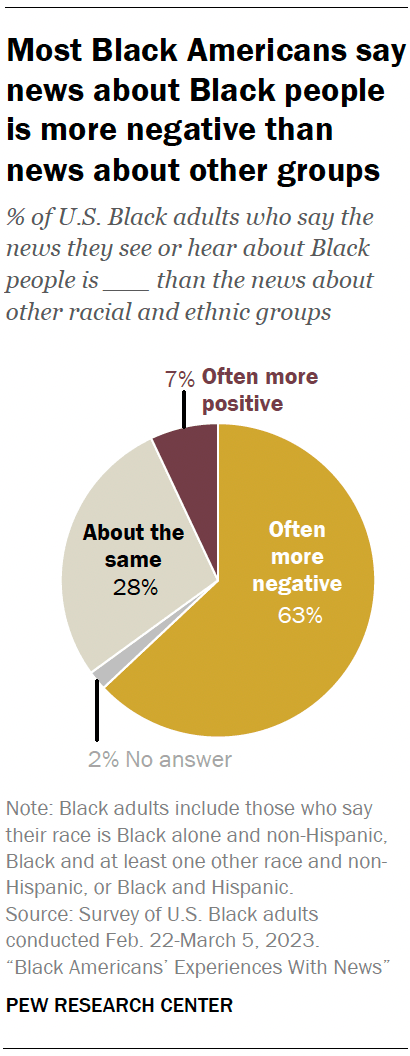
Black Americans see a number of steps that could improve news coverage of Black people. For example, most Black adults say it is extremely or very important that journalists and reporters cover all sides of the issues (76%) and understand the history of the issues (73%) when covering Black people. Many also say it is crucial for journalists to personally engage with the people they cover (59%) and to advocate for Black people (48%).
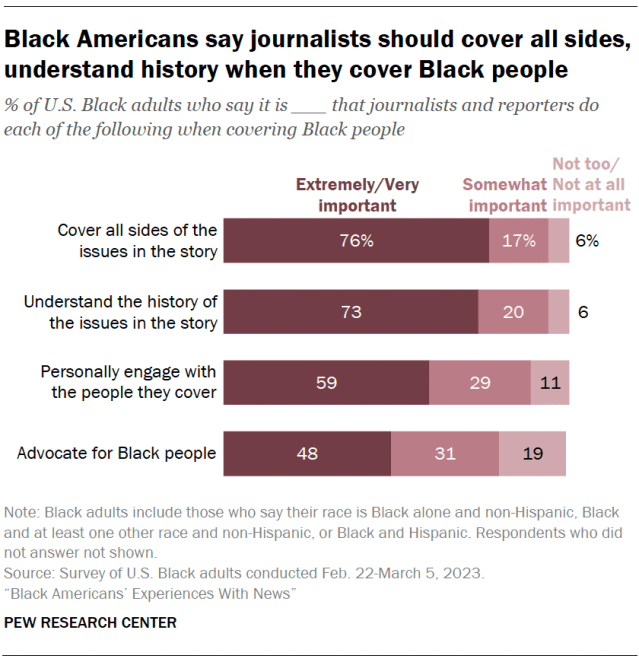
Among Black Americans who say they at least sometimes see racist or racially insensitive news coverage of Black people, 64% say educating all journalists about issues impacting Black people would be highly effective in making coverage more fair. Substantial shares also say more representation would help – such as including more Black people as sources in news stories or hiring them at news outlets for leadership roles or as journalists and reporters.
Black Americans tend to be underrepresented in U.S. newsrooms. Just 6% of reporting journalists are Black, according to a 2022 Pew Research Center survey of U.S. journalists. That is well below the Black share of U.S. workers (11%) and adults overall (12%).
About half of all U.S. journalists (52%) say their news organization does not have enough diversity when it comes to race and ethnicity. That is much larger than the shares of journalists who say the same about gender, sexual orientation and other aspects of diversity.
There is more proportional representation by race and ethnicity in local TV newsrooms, according to the Radio Television Digital News Association. It found in 2022 that 13% of local TV newsroom employees are African American. However, only 6% of news directors – the leaders of such newsrooms – are Black.
Many Black Americans say it’s important to get news about race and racial inequality from Black journalists. But fewer feel this way when it comes to news in general. Four-in-ten Black Americans say it’s extremely or very important that the news they get about race and racial inequality comes from Black journalists. A much smaller share (14%) say it’s highly important that the news they get in general – regardless of topic – comes from Black reporters.
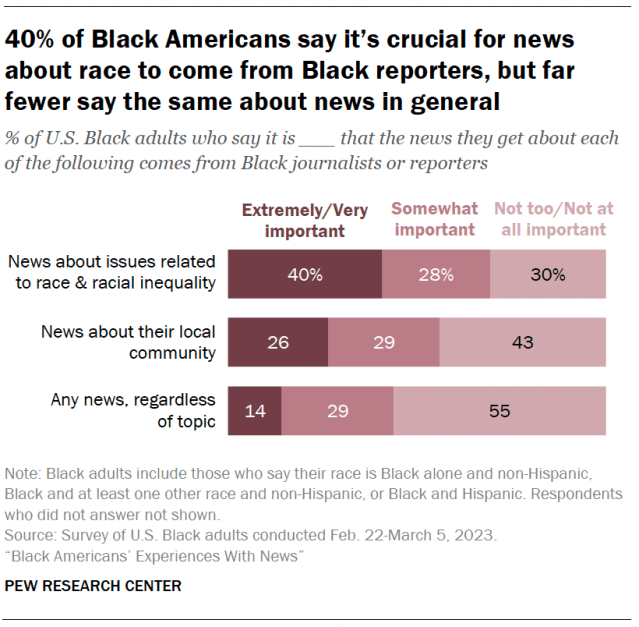
Similarly, just 15% of Black Americans say that whether a journalist is Black is extremely or very important to deciding if a news story in general is trustworthy. Black Americans are much more likely to see other factors as highly important when assessing the trustworthiness of a news story. These factors include the sources cited in the story, the news outlet that covers the story, whether the story is reported by multiple outlets, and their own gut instinct.
About a quarter of Black Americans (24%) say they extremely or fairly often get news from Black news outlets. These outlets, which have a long history in the U.S., are defined as those created by Black people and focused on providing news and information specifically to Black audiences. Another 40% of Black adults say they sometimes get news from such outlets.
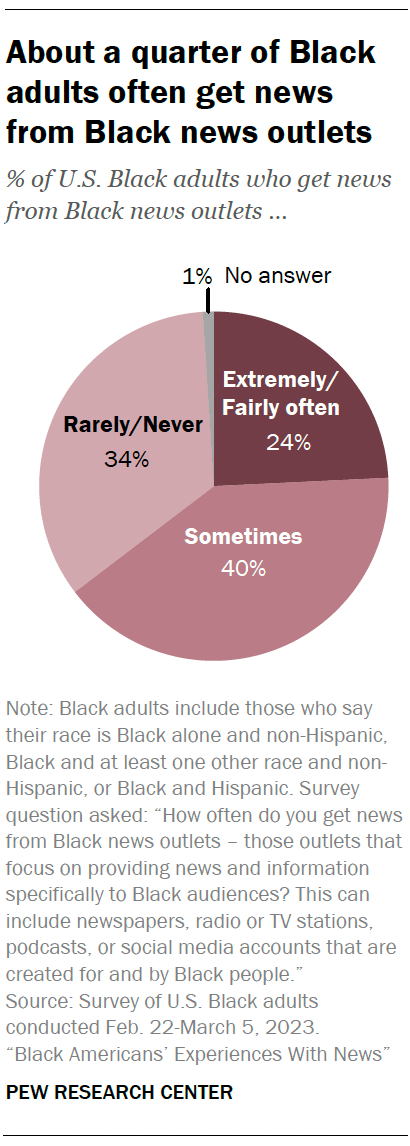
Black Americans are more likely than other racial and ethnic groups to feel that the news media misunderstand them because of their race or some other demographic trait. Roughly similar portions of Americans who are White (61%), Black (58%) and Hispanic (55%) say the news media misunderstand them, but they cite markedly different reasons for this misunderstanding.
Among Black adults who feel this way, about a third (34%) say that what news organizations misunderstand about them most is their personal characteristics. This is far higher than the 10% of White adults and 17% of Hispanic adults who say the same. (The survey included Asian Americans, but the sample size for this group is too small to analyze separately.)
Note: This is an update of a post originally published on Aug. 7, 2019.


